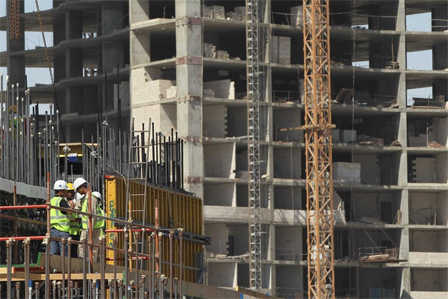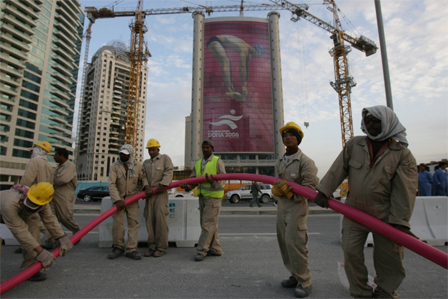Erstellt am: 27. 9. 2013 - 14:45 Uhr
Worked to Death?
Qatar is under increasing pressure to react after an investigation by the Guardian newspaper alleged that dozens of Nepali workers have died in recent weeks as they helped build infrastructure for the 2022 World Cup.
The Guardian report claims the deaths are probably due to appalling working conditions. The investigation also presented some evidence of forced labour and salaries being withheld to prevent the workers from leaving. FIFA, the governing body of world football, has said it is "very concerned" about the claims while the Qatari organisers have insisted that the “dignity and wellbeing” of workers is of "the utmost importance" to them.

ABC News
For today's Reality Check I tracked down the author of the Guardian report, Pete Pattisson, in Kathmandu where he says he has spent days in the arrivals hall of the international airport watching coffins arrive from the Gulf. “It`s a real tragedy,” he told me via a Skype connection, “We can talk about the numbers of people who are dying but you don`t really understand what it means until you see the coffins arriving and you talk to the families who have come to collect the coffins.”
On his trip to Qatar Pattisson obtained documents from the Nepali embassy there. These showed at least 44 Nepali migrants died between early June and early August as the Gulf State rushes to build the infrastructure needed to host the prestigious World Cup in 2022:
“And what is particularly shocking about that is that the most common cause of death among the workers is heart failure. These are young men. They shouldn`t be dying of heart failure.”
Pattisson attributes the deaths to the brutal conditions which he says sometimes fail to meet the most basic international norms. The summer daytime temperatures in the Gulf can hit 50 degrees Celsius but Pattisson reports that he and his team “spoke to at least two groups of workers he get no water on the construction site where they work. They have to go off site. Some told us they went to a local mosque to get water.”
It is not just dehydration and work-place accidents, complains the Guardian, but the cramped and filthy living conditions the migrants face on arrival in the Gulf. Pattisson visited an area called the Industrial Zone on the edge of the capital Doha where he saw row upon row of accommodation blocks for the migrants which the journalist described as “labour camps”. These consist of tiny rooms for the migrant workers to sleep in and a few public areas which are draped with drying clothes. He witnessed filthy toilets and, in one block, 600 workers sharing two small kitchens. The insanitary conditions in the intense heat are a breeding zone for sickness.

AFP
The International Trade Union Confederation (ITUC) has backed the Guardian`s finding. It has been scrutinizing working conditions in the Gulf State for the past year and has said that with an estimated two million migrant workers arriving, mostly from poor Asian countries, the death toll could mount to 4,000 before the start of the tournament unless the Qatari organisers respond quickly with urgent reforms and better oversight.
The images Pattisson and his team have captured of the living quarters are disgusting. The video his team has filmed shows cockroaches crawling over cluttered cell-like rooms, but it is not surprising that thousands of Nepali migrants, from one of the poorest countries in the world still flock to Qatar, one of the richest.
“There is still a great deal of ignorance about the conditions the migrants will face,” complains Pattisson. If the migrants die the disaster is not only felt emotionally but also financially. The Nepalis have often taken out massive loans at steep interest rates (up to 35%) in order to facilitate their recruitment, travel and documentation fees. Bereaved families, which had been counting on the remittance money from the dead relative, are instead saddled with a crippling burden of debt.
Often the migrants feel tricked by the contracts they have signed back in their home countries. On arrival, they sometimes find the deal has changed – but as one Nepali told the journalist: “Of course I am upset, but what can I do about it?” Pattisson spoke to one Nepali who was paid just over half the money he had been promised. He had signed up as a plumber but on arrival was expected to work as a carpenter. Many haven`t been paid at all. But the power is all in the hands of the employers – the employees have few rights. One reported being beaten when he complained about the working conditions.
Many hate the situation but feel trapped. Under the sponsorship law in Qatar the employers have to give their permission before migrants can leave. At the Nepali embassy in Doha, Pattisson found 30 frightened Nepalis sheltering in a back room. They told him that their employer hadn't paid them in months but nor had they given them permission to leave. So they were stuck in impoverished limbo. If they run away from their employer they are classed as “illegal immigrants” and face detention.

Getty
Pattisson says the Nepali government has a responsibility to monitor their recruitment agencies so that Nepalis travelling abroad are not “deceived or tricked” by the recruiters and will understand exactly the conditions they will face.
The Qatari government has said it is “appalled” by the Guardian`s findings and says that it already has the laws in place to prevent the abuse of migrants. But Pattisson says that that is not enough. “We need those laws to be enforced,” says the investigative reporter, “and I don`t think it would be too difficult to do that.” He says the problem is not hidden. In just a few days he spoke to dozens of migrants who openly listed experiences of abuse.
Although he has been encouraged by FIFA's expression of “shock” he says that “there is a responsibility from all sides to stop just talking about the problem and actually do something about it."


